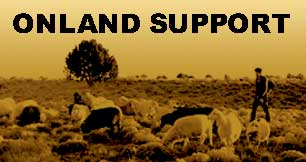The Black Mesa Syndrome: Indian Lands, Black Gold
June 13, 1998 by pathfinder
Filed under Uncategorized
Black Mesa is not black and it is not a mesa. It is four thousand square miles of ginger-colored plateau land in northern Arizona, a distinct elevated landmass the shape of a bear’s paw. On a map, the Black Mesa coal field looks like an inkblot on a Rorschach test, following the contours of the Pleistocene lake it once was. Over thousands of years the vigorous forests and plant life embraced by the lake decayed into a bog which in turn hardened to coal–some twenty-one billion tons of coal, the largest coal deposit in the United States.
Until 1969, the coal lay untouched and so close to the surface that the walls of the dry washes glistened with seams of shiny black. With a long-term value estimated as high as $100 billion, it lies completely under Indian reservation lands, for Black Mesa is also home to some sixteen thousand Navajos and eight thousand Hopis. In 1966, the Hopi and Navajo tribal councils–not to be confused with the general tribal population–signed strip-mining leases with a consortium of twenty utilities that had designed a new coal-fired energy grid for the urban Southwest.


